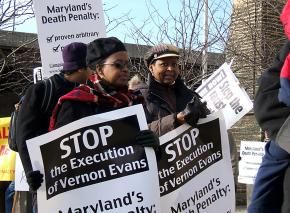Maryland police forced to release spy files
reports on a victory for activists who were spied on by the Maryland state police.
AS THE state police spying scandal in Maryland continued to unfold, victims of the politically motivated surveillance conducted by the Maryland State Police (MSP) scored a significant victory this week by forcing police to release physical copies of their files.
Back in July, the state attorney general's office released 43 pages of surveillance reports compiled by the MSP to the American Civil Liberties Union (ACLU) in response to an ACLU legal action taken on behalf of Baltimore peace activist Max Obuszewski. Within the 43 pages released by the state were detailed notes taken by four undercover police agents who attended multiple anti-death penalty and antiwar organizing meetings, public forums and protests from March 2005 through May 2006.
Also included in the 43 pages were approximately six pages of a printed report from the Baltimore/Washington High Intensity Drug Trafficking Areas database (HIDTA). The documents revealed that Obuszewski had been entered into the database with the "crime" designations of "terrorism--anti-war protestors" and "terrorism--anti-government."

The express purpose of the database is to share information between the myriad federal, state and local law enforcement agencies in the region.
The MSP's initial response was to deny any wrongdoing. This perspective was confirmed by the testimony of former State Police Superintendent Thomas Hutchins before a hearing of the state senate judicial proceedings committee in Annapolis: the spied-upon activists were "fringe people" who need to be watched, Hutchins said.
A 60-day investigation conducted by former state Attorney General Stephen Sachs at the request of Gov. Martin O'Malley determined that the MSP's actions were a misguided approach based on, in Sachs' words, a "better safe than sorry" attitude toward law enforcement.
The Sachs report, released on October 1, revealed that the MSP had entered the names of some number of activists in addition to Obuszewski into the HIDTA database, and that several organizations, including ANSWER and the Campaign to End the Death Penalty, had been entered as "security threat organizations."
The MSP responded to release of the Sachs report by announcing that a shocking 53 individuals had been entered into the HIDTA database as being "suspected of involvement in terrorism."
IN SUBSEQUENT weeks, dozens of activists from as far away as New York and California received letters stamped with the signature of current police superintendent Terrence Sheridan, informing them, "You are one of the individuals whose name was placed in the Case Explorer system under this designation."
The named activists include members of a broad range of organizations, including Code Pink, the pacifist Iraq Pledge of Resistance, the Washington Peace Center and the Campaign to End the Death Penalty, as well as longtime global justice activists and staff members of the environmental group Chesapeake Climate Action Network.
In fact, the list of letter recipients was so long and covered such a broad range of activism that it appeared the MSP had classified any and all peaceful political activism in Maryland as potential "terrorism."
In this context, Sheridan's "invitation" to recipients to come down to state police headquarters and view an electronic version of their file before it was "purged" from the system was met with suspicion. The MSP denied activists' requests that they be allowed to bring attorneys into the MSP offices and said it wouldn't give activists paper copies of their files.
Activists responded by refusing to cooperate. Instead, they held multiple press conferences, wrote letters to the editor, and wrote to and called Governor O'Malley with a list of demands. These efforts garnered significant statewide media attention and some national coverage.
On October 22, the MSP reversed its position and--one hour before a scheduled protest outside police headquarters--issued a press release caving to activists' demands. The agency will now mail out physical copies of the surveillance files, and those activists who choose to come to view their file in person will be allowed to bring an attorney.
Once activists receive their files, they will be able to work with the ACLU to determine what crucial information the MSP may still be withholding. Moreover, because activists are working together, they will be better able to shed public light on the vast political spying operation the MSP remains committed to covering up.
The stronger that Maryland peace and justice activists have stood up for their rights to organize and protest, the more the apparatus of state surveillance has been revealed. Now, there is some evidence to indicate that the spying continued beyond the May 2006 time frame admitted to so far, and that it involved law enforcement agencies in addition to the MSP.
The Maryland ACLU recently filed additional public information act requests on behalf of some 32 advocacy groups and over 250 individuals who believe they may have been among those targeted. In short, this struggle is far from over.


